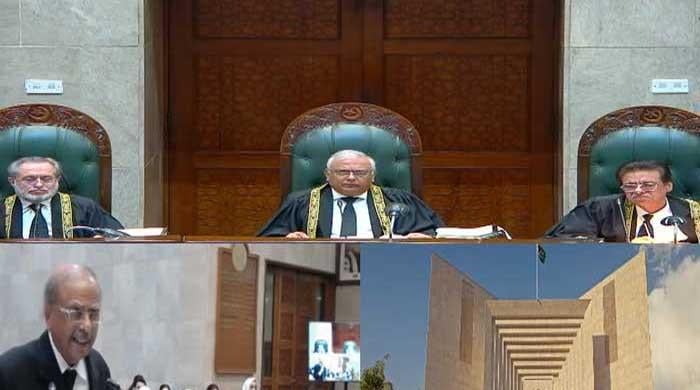Supreme Court Justice Addresses 26th Constitutional Amendment
ISLAMABAD: Justice Jamal Khan Mandokhail of the Supreme Court remarked on Thursday that the judges of the apex court have, whether by choice or necessity, acknowledged the 26th Constitutional Amendment.
Justice Mandokhail made these comments during the proceedings concerning multiple petitions submitted against the debated constitutional adjustments approved by the parliament in October of the previous year.
The hearing, which was broadcast live on the SC’s YouTube channel, was conducted by an eight-member constitutional bench. Justice Amin-ud-Din Khan presided over the bench, which also included Justices Muhammad Ali Mazhar, Ayesha A Malik, Syed Hasan Azhar Rizvi, Musarrat Hilali, Naeem Akhter Afghan, and Shahid Bilal Hassan.
The bench resumed the case’s hearing following a nine-month interval.
Numerous parties, such as Pakistan Tehreek-e-Insaf (PTI), Jamaat-e-Islami (JI), Sunni Ittehad Council (SIC), alongside several bar associations and former presidents of the Supreme Court Bar Association (SCBA), had contested the amendment in October 2024.
The revisions to the constitution, now in effect, mandate the legislature to select the chief justice, determine the top judge’s term, and establish constitutional benches.
During the session, Munir A Malik of the Balochistan High Court Bar Association (BHCA) echoed the arguments put forth by LHCBA lawyer Hamid Khan on Wednesday, pointing out that the full court existed even before the amendment.
The lawyer advocated for a bench comprising all SC judges to preside over the case. He asserted that the constitutional bench possessed the necessary judicial authority and that any individual could issue a judicial order without impediment.
Justice Amin-ud-Din noted that the matter of the court’s jurisdiction fell within the merits of the case, while Justice Ayesha questioned whether a full court could be convened given the 26th Amendment.
In response, lawyer Malik stated that he regarded the constitutional bench as an extension of the SC itself, asserting that the amendment did not curtail the court’s jurisdiction and that the Judicial Commission of Pakistan (JCP) retained the power to nominate any judge.
“Regardless of whether a bench is constitutional or otherwise, the current one possesses the [necessary] judicial powers,” the counsel stated, adding that the judicial committee was empowered to form any bench it deemed appropriate.
Justice Hilali questioned how the existing bench could rule on its own jurisdiction.
“Judges who received promotions following the 26th Constitutional Amendment should recuse themselves from the bench,” Justice Hilali suggested.
Justice Mandokhail responded by questioning whether the new judges had been recruited from abroad.
Justice Mazhar pointed out that the new judges elevated to the SC had no connection to the amendment and that the four newly appointed judges had previously served as chief justices of high courts.
Justice Hilali clarified that her remarks were devoid of any malicious intent.
“All judges are respectable and should not be implicated [in this matter],” Justice Mandokhail stated, recalling that he and the Chief Justice of Pakistan (CJP) had advocated for the inclusion of all judges in the constitutional bench during every JCP meeting.
Following Malik, lawyer Abid Zuberi, representing six former presidents of the Supreme Court Bar Association (SCBA), presented his arguments to the court, contending that it was unnecessary for every judge to be present on the bench in a full court.
He noted that the quorum could be fulfilled by the available judges in a full court.
When asked to whom the bench should direct to form a full court, Zuberi suggested that the bench should instruct the SC’s Practice and Procedure Committee.
“The Practice and Procedure Committee [constituted] prior to the enactment of the 26th Constitutional Amendment will form a full court,” the counsel concluded.
After considering the arguments, the court postponed the hearing until Monday of the following week.



Comments (0)
No comments yet. Be the first to comment!
Leave a Comment